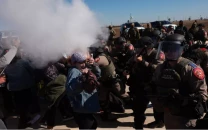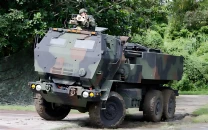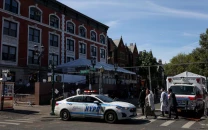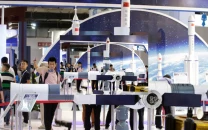Rickshaw 'ambulance' offers free oxygen, transport for virus patients
Khan, sold his wife's jewellery and converted his three-wheeled vehicle into a small ambulance

When Indian auto-rickshaw driver Mohammad Javed Khan saw people carrying their coronavirus-stricken parents to hospitals on their backs as they were too poor to afford an ambulance, he knew he had to help.
Khan, a 34-year-old driver in the central Indian city of Bhopal, sold his wife's jewellery and converted his three-wheeled vehicle into a small ambulance, fitting it out with an oxygen cylinder, an oximeter to measure oxygen levels in the blood, and other medical supplies.
As India grapples with a harrowing Covid-19 crisis that has seen infections skyrocket and the healthcare system stretched to breaking point, individuals like Khan have stepped forward to try and help their local communities.
"A critically ill patient cannot be brought to the hospital without oxygen support. So, I thought, why not turn my three-wheeler into an ambulance. It's not as spacious as an ambulance, but it can surely save lives," Khan told AFP.
"I see young people struggling without oxygen. Even when they call ambulances, the ambulances are charging 5,000-10,000 rupees ($70-140). How will a poor person be able to afford it? Especially during this pandemic when most people don't have an income?"
A donor provided him with a cylinder and another with the oximeter.
A doctor taught Khan how to use the cylinder and oximeter to safely supply the lifesaving gas to patients as he drove them to a hospital.
"Many people have come forward to help me with donations and have requested me to continue driving around until the pandemic is over," he said.
"It is thanks to the help of so many people, I am able to do this. I couldn't have done this on my own."
Khan briefly ran into trouble with the authorities when police charged him for operating his auto-rickshaw without an emergency permit during Madhya Pradesh state's virus lockdown, India Today reported.
But after an outcry on social media, police withdrew the charges and issued him with a special pass, the broadcaster added.
Madhya Pradesh, like many other states, has witnessed a spike in cases in recent weeks that had led to shortages of oxygen and other critical medical supplies.
Crematoriums and burial grounds have also struggled to cope with the influx of bodies.
The state reported more than 12,000 new infections on Monday, with one in five people tested receiving positive results.



















COMMENTS
Comments are moderated and generally will be posted if they are on-topic and not abusive.
For more information, please see our Comments FAQ